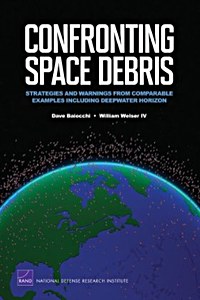Review: Confronting Space Debrisby Jeff Foust
|
| Moving to remediation, the book argues, may require a “catastrophic” event that lowers the community’s risk tolerance—which suggests the problem of orbital space debris may get worse before it gets better. |
The authors apply a four-stage framework to addressing these problems: identification, establishment of behavioral norms, mitigation, and remediation. Moving from one step to the next, they argue, takes place when the number of incidents exceeds the community’s risk level. For orbital debris, the problem is at the mitigation stage: taking steps to reduce the growth in the population of debris. They argue that the problem is not severe enough now, though, to move to remediation, or actively removing debris, given the lack of government and private interest (particularly funding) for remediation efforts despite their increasing utilization of space. “[I]f debris were deemed to represent an unacceptable risk to current or future operations,” they write, “a remedy would already have been developed by the private sector.”
The authors, though, do provide some lessons for any future remediation efforts, using the saga of the Deepwater Horizon—the oil rig that was destroyed in the Gulf of Mexico in April, creating the largest oil spill in US history—as a case study. The biggest lesson, they argue, is that any remediation technologies need to be tested first in actual operating conditions, as many of the efforts tested on the Deepwater Horizon spill failed because they had not been previously used in deep ocean conditions. The event also demonstrated the need to have multiple approaches to solving the problem, as no single approach can work all the time.
For the time being, though, the focus on orbital debris appears oriented more towards mitigation instead of remediation, despite some efforts by DARPA to study remediation technologies under its “Catcher’s Mitt” program. For example, last week Frank Rose, Deputy Assistant Secretary of State for Space and Defense Policy, told a Stimson Center audience in Washington that the US government would make a decision soon on whether to support a proposed “Code of Conduct” for space activities published by the EU two years ago that, among other measures, calls for nations to take steps to avoid collisions and other activities that create debris. That proposed code, Rose said, “is very consistent with the key policies outlined in the president’s new space policy,” which also includes provisions calling for orbital debris mitigation. Moving to remediation, Confronting Space Debris argues, may require a “catastrophic” event that lowers the community’s risk tolerance, as has happened in other fields—which suggests the problem of orbital space debris may get worse before it gets better.
